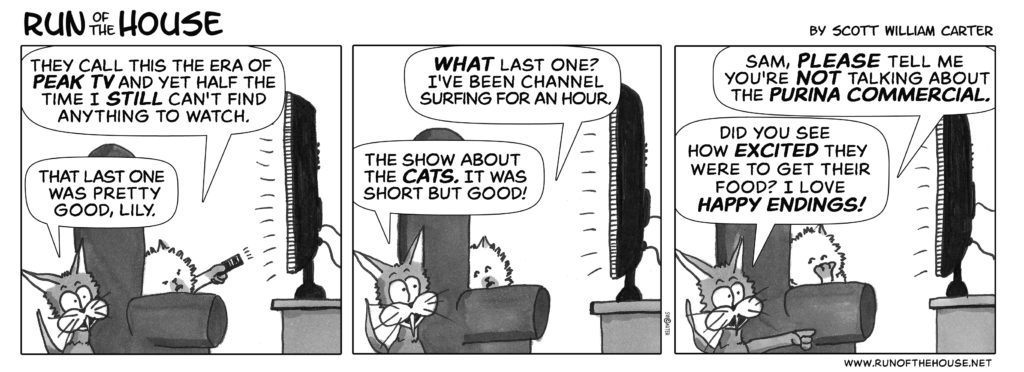A few nights ago, Heidi and I watched the new Downton Abbey movie, Downton Abbey: A New Era, on Peacock TV. A big Downton Abbey fan, I’ve been wanting to watch the movie for a while, but not quite enough to go see it in a movie theater. It only cost $10 to subscribe for a month to Peacock premium, the streaming service plan from NBCUniversal that’s free of commercials, which is less than the cost of one movie ticket. Plus I figured it would give us a chance to sample what else Peacock has to offer for a few weeks, something I doubt I would have done otherwise.

I loved Downton Abbey: A New Era in the way I love catching up with old friends. It really feels a fitting way for the show to end. Will it, though? With so many streaming services competing for a finite amount of viewer attention, everyone is desperate to build a catalog of “must see” shows or movies to keep their subscribers from bailing. But how many “must see” shows can there really be? Back in 2015, John Landgraf, the president of FX Networks, coined the term Peak TV, saying that with such a huge explosion in scripted content, we would begin to see a decline in quality in the following years because the talent needed to create them was spread too thin.
Did we? There’s definitely more bad stuff. There’s a huge sea of dreck, in fact. But there’s just more of everything — the good, the bad, and the vast, vast quantities of mediocre. I’ve always been fairly picky about what I watch (we dropped our cable years ago and just went with on demand entertainment, rotating through the various services depending on what’s available), but I find myself getting even pickier because of the huge selection of quality shows. When I was a kid, I would have thought The Book of Boba Fett, on Disney+, was amazing, but I still haven’t gotten around to watching the last episode. It was just . . . so-so.
And for me, at least, so-so doesn’t cut it any more, not when I have so many choices. The same is true for books and everything else. Of course, taste is subjective, but it has got me thinking about what it means to be a fiction writer in what I’d call the age of Peak Entertainment. It’s not just TV that’s had an explosion of choice. It’s everything. My kids probably spend more time watching YouTube than they do Netflix. My son is a voracious reader, but he’s the exception among his friends; most of them spend their time playing video games online, or, when they get together, Magic the Gathering or D&D. My wife loves to unwind by watching a design show, which have proliferated in recent years. There used to be a couple of design shows and now it seems like there are fifty. That’s not an exaggeration. In fact, there are probably more than fifty.
There’s really something for everyone. What does it mean for a fiction writer like me? Well, reading has always been a niche form of entertainment anyway. But so has everything else. It’s just more so now. When non-readers ask me if people still buy books, I usually reply by asking them if they know what the second most popular sport in the world is. (Most people know #1, which is football, or what we call soccer in the U.S.) It’s actually Cricket, which usually surprises Americans since the sport is not very popular here, but has more than 2.5 billion global fans.
My point? That it’s always been the case that something can be popular with a group of people, sometimes even a huge group of people, and barely be noticed by everyone else. In general, though, I do think that the big, bit hits are probably becoming more rare (a Game of Thrones or Spider-Man), don’t last as long (everyone was talking about Bridgerton only a few weeks ago and now . . . zilch), and usually don’t reach as many people. Publishing is a great example of this. If you include all books published (not just the ones from major conglomerates, but the small presses and independently published books), there are more books published, and, more importantly, more books sold than ever before. Backlist, whether it’s books, video, or music, is king. (All those linked articles are worth reading, by the way.) Ecommerce enabled a long tail of inventory, that term coined by Chris Anderson years ago, so that people have more choices. So far from publishing being in decline, the truth is actually the opposite. There are just more players and the money is spread around a bit more . . . to a point. All forms of entertainment still follow a Power Law curve, with the bestsellers still taking a huge share of the sales. But going forward, just a bit less so.
Maybe. Predictions make fools out of all of us. Again, what does it mean for the individual fiction writer, though? Since backlist sells so well, it means a focus on the long game is critical. If you want to build an audience and possibly make a living, and you don’t get lucky and win the literary lottery, you’re going to need a substantial body of work. But being prolific is not enough. I’ve now seen plenty of examples of writers with huge backlists that just . . . don’t sell. Not much anyway. Even for the halfway competent writers, I used to be able to chock up the majority of these cases to bad covers or narrow niche appeal, but now I’m seeing even writers with quality presentation, decent writing, and smart promotion not selling much.
Getting back to the Peacock service I mentioned at the start of this, I think a lot of this has to do with consumer choice. So-so doesn’t cut it any more. Even vast quantities of so-so. When I look at what’s available on Peacock, I see a lot of . . . sameness. The same thing is true in books. They all just become a blur. So my advice to the individual writer is to focus on getting really good and (hopefully) developing a compelling author voice along the way. Read a lot and read broadly! I’m stunned how many writers don’t really read that much, even some very prolific writers. It’s usually pretty obvious in their work. They stop growing. Take some chances! Some of those chances won’t find an audience, but even if they don’t they’ll help you grow and get better.
Beyond that? Patience, more than ever. Enjoy the work itself. You don’t have to enjoy it all the time, of course, but if you don’t enjoy the process overall, then maybe it’s time to explore whether a different mode of creative of expression is a better fit? Just a thought.
Or maybe there’s something to watch on Peacock. Somebody has to be watching those Melrose Place reruns.

